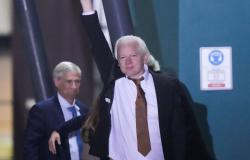François Lecointre, 62, was chief of staff of the armed forces from 2017 to 2021, after serving as head of the military cabinet of prime ministers Manuel Valls, Bernard Cazeneuve and Edouard Philippe. In 1994, he participated in Operation Turquoise in Rwanda, then left for Bosnia, where he led the assault to recapture the Vrbanja bridge from the Serbs, the last “bayonet to the cannon” fight of the French army. He has just published with Gallimard Between wars (Gallimard, 128 pages, 17 euros), a sober and profound meditation on the profession of soldier.
I wouldn’t have gotten here if…
…If I hadn’t had a disturbing encounter with my mother’s brother, Hélie, who died at 23 in Algeria. Cornered under rebel fire in a burned area, he remained in his armored car to cover his men. He didn’t have time to escape, he burned to death. I never knew him. But I loved looking at his photo, placed on a fireplace in the living room, in my grandmother’s house. He is in profile, head tilted, with a smile that is both simple and gentle. This man fascinated me: so young and so fragile, and yet died a hero. While I was impressed by the powerful, dominant stature of my father – an unattainable model for me – Uncle Hélie’s apparent fragility, his humanity, made this heroism accessible to me. Without him, I would not have had the audacity to choose the profession of arms.
Why did your father, former commander of the submarine “Le Redoutable”, impress you so much?
He was a tall, elegant guy, quite austere, severe and authoritarian, intelligent and cultured. Everyone had a natural reverence for him. Our relationships were distant. He died at age 53, in the mountains. I was 22 years old and had just joined Saint-Cyr. We were just beginning to establish a form of complicity, not from father to son but from officer to officer. I couldn’t take advantage of it.
What was your mother like?
She was an artist, painter and restorer of paintings. A charming woman, very cheerful, a little bohemian. She raised her five children with astonishing carelessness. While my father demanded tidy rooms and homework done, she didn’t care at all.
Who were your models?
I read a lot. I admired Lucien Leuwen [personnage de Stendhal] or Angelo, from Hussar on the roof [Jean Giono], which I found fascinating, graceful, sometimes a little silly. I also became attached to the figure of Captain Hornblower, hero of a series of maritime adventure novels written between the two wars by an Englishman, Cecil Scott Forrester. The author depicts a man who spends his life hesitating. Whatever his successes, he continues to doubt himself. This is what attracted me to the profession of soldier: the fact of setting an ambition to rise above yourself, because you are not sure of what you are. .
You have 77.16% of this article left to read. The rest is reserved for subscribers.







